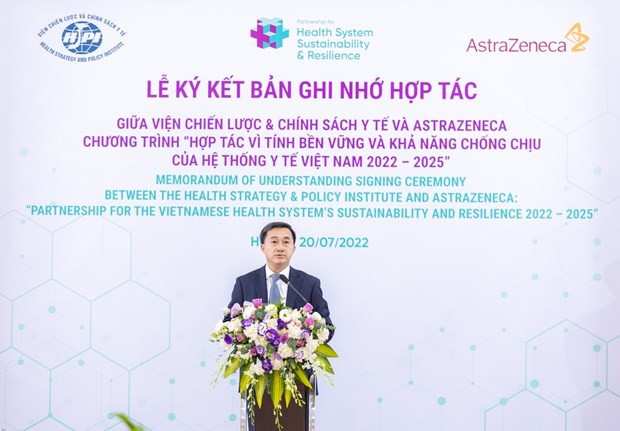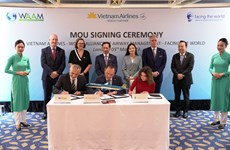Domestic healthcare system needs comprehensive evaluation: official
 Illustrative image (Source: VNA)
Illustrative image (Source: VNA)Hanoi (VNA) – Deputy Minister of Health Tran Van Thuan has stressed the need for a comprehensive review of the domestic medical system after the COVID-19 pandemic to draw lessons from pandemic prevention and control.
The official made the remarks at the signing ceremony of a memorandum of understanding (MoU) between the Health Strategy and Policy Institute (HSPI) under the Ministry of Health and AstraZeneca Vietnam in Hanoi on July 20.
Under the MoU, the two sides will commence the Partnership for the Vietnamese Health System’s Sustainability and Resilience (PHSSR) programme in 2022-2025.
Healthcare system severely affected by COVID-19
 Deputy Minister of Health Tran Van Thuan speaks at the signing ceremony. (Photo: VNA)
Deputy Minister of Health Tran Van Thuan speaks at the signing ceremony. (Photo: VNA)Thuan said through the pandemic fight, the domestic healthcare system has proven its response capacity and resilience against epidemics. However, in fact, it was still heavily affected by both the pandemic and pre-existing issues such as non-communicable diseases, population aging, the limited capacity of the grassroots healthcare system, and a staffing crunch.
To achieve the target of universal health care as part of the Government’s sustainable development efforts, the medical sector should be enhanced comprehensively, he continued.
HSPI Director Tran Thi Mai Oanh noted: “The pandemic has allowed us to objectively assess the strengths and limitations of the healthcare system.
“Through this programme, we aim to provide valuable evidence to build health policies that will help boost the Vietnamese healthcare system’s post-pandemic recovery and preparedness for future diseases.
“We are thankful for the continued support of AstraZeneca and other partners in this new phase of the PHSSR, joining hands to build a fair, efficient, quality, and sustainable healthcare system for all."
Strengthening sustainability – to priority
 At the signing ceremony (Photo: VNA)
At the signing ceremony (Photo: VNA)Nitin Kapoor, Chairman and General Director of AstraZeneca Vietnam and Asia Area Frontier Markets, said: "During this period when the COVID-19 has subsided, we need to seize the opportunity to address other important and urgent challenges. These are ensuring health care for patients with non-communicable diseases, namely cancer, cardiovascular and respiratory diseases. Also critical is maintaining the continuous supply of health financing, medicines, vaccines and medical equipment.
"We hope that this partnership with HSPI and partners will comprehensively strengthen the healthcare system, accelerate local manufacturing, and benefit the whole society.”
Under the MoU, with support from AstraZeneca, the HSPI will advance the research and recommendation of policy solutions according to three main objectives, namely strengthening the sustainability of health financing; ensuring Vietnam’s self-sufficiency in terms of medicine and vaccine supplies; and improving access to healthcare and the management and treatment of non-communicable diseases at medical facilities.
This MoU follows the successful implementation in 2020 and 2021 of the global PHSSR’s pilot phase, which was jointly founded by the World Economic Forum, London School of Economics, and AstraZeneca.
Vietnam was the first country in Asia to join the programme, and as part of it, the HSPI adopted a framework devised by the PHSSR to analyse the strengths and limitations of the health system, which were later presented in the PHSSR Vietnam report.
The PHSSR’s mission is to study and build healthcare systems that are both resilient to crises and sustainable in the face of long-term stress. It does this by providing tools and resources for research, a focal point for collaboration and knowledge exchange within and between countries, and a platform to disseminate and catalyse the adoption of breakthrough insights.
The framework was run as a pilot in Vietnam and seven other countries (the UK, France, Germany, Italy, Poland, Spain, and Russia) analysing health systems against the framework criteria. An action plan was then established for each country with a series of steps for health leaders and policymakers to take to strengthen systems against future crises.
In 2022, the framework is operating in 13 more countries. Additionally, in 2022, Philips, KPMG, the WHO Foundation, the Centre for Asia-Pacific Resilience and Innovation, and Apollo Hospitals have come on board as partners./.












